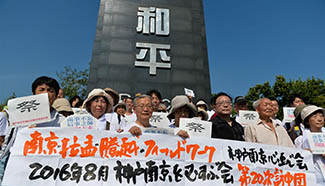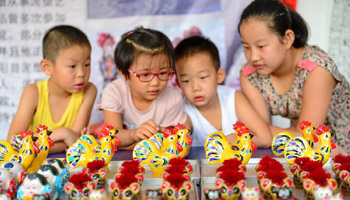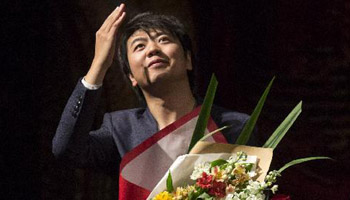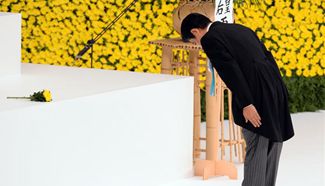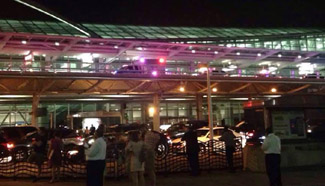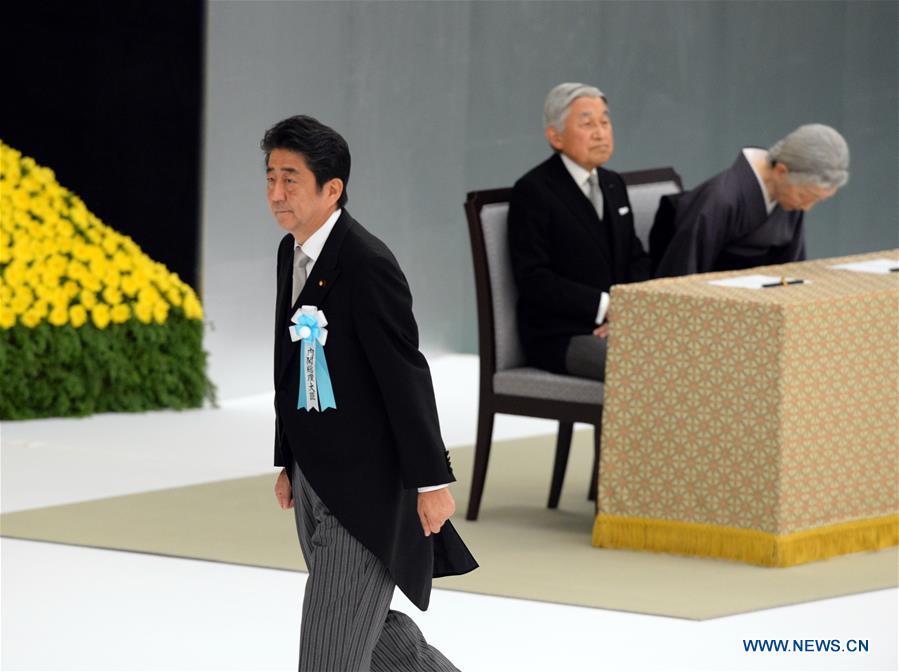
Japanese Prime Minister Shinzo Abe (front) attends the ceremony marking the 71st anniversary of Japan's unconditional surrender in World War II in Tokyo, Japan, Aug. 15, 2016. The Japanese government held an annual ceremony Monday in Tokyo to mark the 71st anniversary of Japan's unconditional surrender in World War II (WWII) and Prime Minister Shinzo Abe once again failed to mention "reflection" over the past war. (Xinhua/Ma Ping)
by Xinhua Writer Zhu Dongyang
BEIJING, Aug. 15 (Xinhua) -- Seventy-one years following Japan's surrender in World War II, the specter of militarism is still haunting the country and the Asia-Pacific.
In his speech at a ceremony marking the anniversary in Tokyo on Monday, Japanese Prime Minister Shinzo Abe failed again to offer a sincere apology for the country' s wartime aggression in Asia, and failed to pledge not to return to war.
Abe's remarks can be seen as yet more proof of his intention to regain constitutional power for combat in foreign lands.
However, the latest polling results show that nearly half of Japan's general public is against any plans by their country to return to war.
In a move to manipulate public opinion, Abe and his team are cultivating a sense of fear among the people by cooking up the so-called "China threat," fanning flames in the South China Sea, and hyping up island disputes with South Korea.
In its maritime dispute with Beijing in the East China Sea, Tokyo is seeking to strengthen its military posture in the area by developing a new land-to-sea missile as a deterrent to what Japan calls "Chinese intrusions" in the surrounding waters of the Diaoyu Islands.
Yet considering the islets are part of Chinese sovereign territory, Japan's move serves no more than another excuse for militarizing the region, and would place more hurdles in the way of any future attempts for a peaceful settlements to the spats.
While making turbulent waves in the region, Tokyo is trying to play innocent. On the one hand, Abe blames other countries for refusing to engage in dialogue with him to reduce tensions. On the other hand, his provocations continue over sensitive historical issues, and he refuses to apologize for his country's wartime atrocities.
Knowing quite well that it would be extremely offensive to Japan' s neighbors, Abe still offered a ritual offering to the Yasukuni Shrine, a symbol of Tokyo' s wartime militarism, on a day when he should have repented the country' s past crimes. Earlier in the day, two senior Japanese politicians, Koichi Hagiuda, deputy chief Cabinet secretary, and former defense minister Gen Nakatani visited the shrine that honors 14 Japanese war criminals.
Meanwhile, the current Japanese government is using its alliance with Washington as an expressway to reach its goals. And to maintain a dominant role in the Asia-Pacific, the United States is using Japan as a counterbalance to China's rise, and winks at Tokyo's reckless moves.
But Washington needs to know that a right-wing and ultra-nationalist Japan may not be satisfied with staying as America's stooge in the region. Washington's scheme would eventually backfire.
Now is the time for Japan's neighbors to stand together and take all possible countermeasures to ensure that Japan behaves according to the rules set by the international community after WWII.
Peace-loving Japanese people should also remain vigilant over the right's plots to challenge regional peace and stability.
Also in Monday' s speech, Abe said Japan wants to contribute to world peace. Well, if Abe truly means that, then issuing an apology would be a good start.
Related:
TOKYO, Aug. 15 (Xinhua) -- History is a mirror to the future. If Japan continues to view its war-time past distorted and whitewashed by rightwing revisionists without earnest reflection and repentance, it will have a precarious future in which "horrors of war" could be repeated.
Aug. 15 marks the day when Japan unconditionally surrendered in World War II, bringing an end to the war, the deadliest conflict in human history that witnessed the loss of about 70 million lives. Full story




